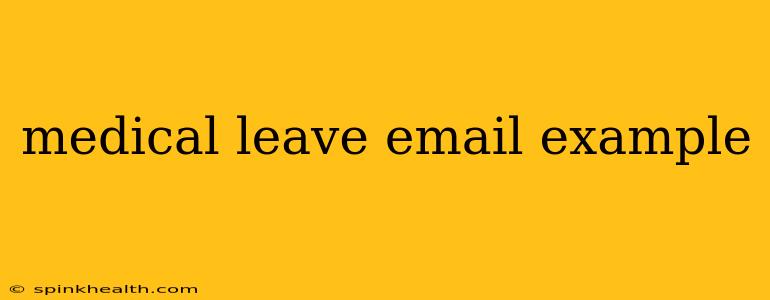Navigating the Terrain of Medical Leave Emails: A Guide with Examples
Requesting medical leave can feel daunting, a delicate dance between professionalism and the need to prioritize your health. This guide will walk you through crafting compelling and effective medical leave emails, drawing on various scenarios and offering examples to help you navigate this often tricky situation. We'll also address common questions surrounding medical leave, ensuring you're well-equipped to handle this process smoothly.
Example 1: Short-Term Leave for a Minor Illness
Subject: Absence from Work - [Your Name]
Dear [Manager's Name],
This email is to inform you that I will be taking a short leave of absence from work due to illness. I expect to be back in the office on [Return Date]. I will monitor my emails periodically for urgent matters.
Thank you for your understanding.
Sincerely,
[Your Name]
Example 2: Longer-Term Leave Requiring More Detail
Subject: Medical Leave Request - [Your Name]
Dear [Manager's Name],
I am writing to request a medical leave of absence from [Start Date] to [End Date]. I have been experiencing [Brief, general description of health issue, e.g., a recurring health problem requiring medical attention]. I have attached a doctor's note confirming this.
I understand this may cause some disruption, and I apologize for any inconvenience this may cause. I will do my best to prepare for my absence by [mention any handover plans, e.g., completing urgent tasks, delegating responsibilities]. I will also be checking emails periodically for urgent matters. I will keep you updated on my progress and expected return date.
Thank you for your understanding and support.
Sincerely,
[Your Name]
Example 3: Leave for a Family Member's Illness
Subject: Medical Leave Request - Family Emergency - [Your Name]
Dear [Manager's Name],
I am writing to request a medical leave of absence from [Start Date] to [End Date] to care for a family member experiencing [brief description of situation]. This requires my immediate and full attention.
I have already [mention any steps taken to minimize disruption, e.g., delegated tasks, informed colleagues]. I will be checking emails intermittently for urgent issues. I will update you on my return to work as soon as possible.
Thank you for your compassion and understanding during this difficult time.
Sincerely,
[Your Name]
H2: Frequently Asked Questions about Medical Leave Emails
H3: How much detail should I provide in my medical leave email?
The level of detail depends on the situation. For short-term absences, a brief explanation is sufficient. For longer leaves, providing a bit more context (without oversharing private medical information) helps your manager understand the situation and plan accordingly. Always adhere to your company's policies regarding medical leave disclosures.
H3: Do I need a doctor's note?
Company policy dictates this. Some organizations require doctor's notes for any leave, while others may only require them for extended absences. Always check your company's handbook or HR department for specific guidelines.
H3: What if I don't know my exact return date?
If you don't have a firm return date, indicate this clearly in your email. For example, "I am requesting a leave of absence starting [Start Date], with a return date to be determined following my medical appointments." Keep your manager updated as you know more.
H3: How can I minimize disruption during my leave?
Proactive planning is key. Before your leave, try to complete urgent tasks, delegate responsibilities to colleagues, and create a detailed handover document. This demonstrates responsibility and helps maintain workflow.
H3: What if my request is denied?
If your request is denied, understand the reasons provided. Consult with HR to discuss your options and explore alternatives. Remember, your health and well-being are paramount.
Remember to always tailor your email to your specific situation and company policy. This guide provides a framework; use it to create a professional and informative email that effectively communicates your need for medical leave. Open communication with your manager throughout the process is crucial for a smooth return to work.

